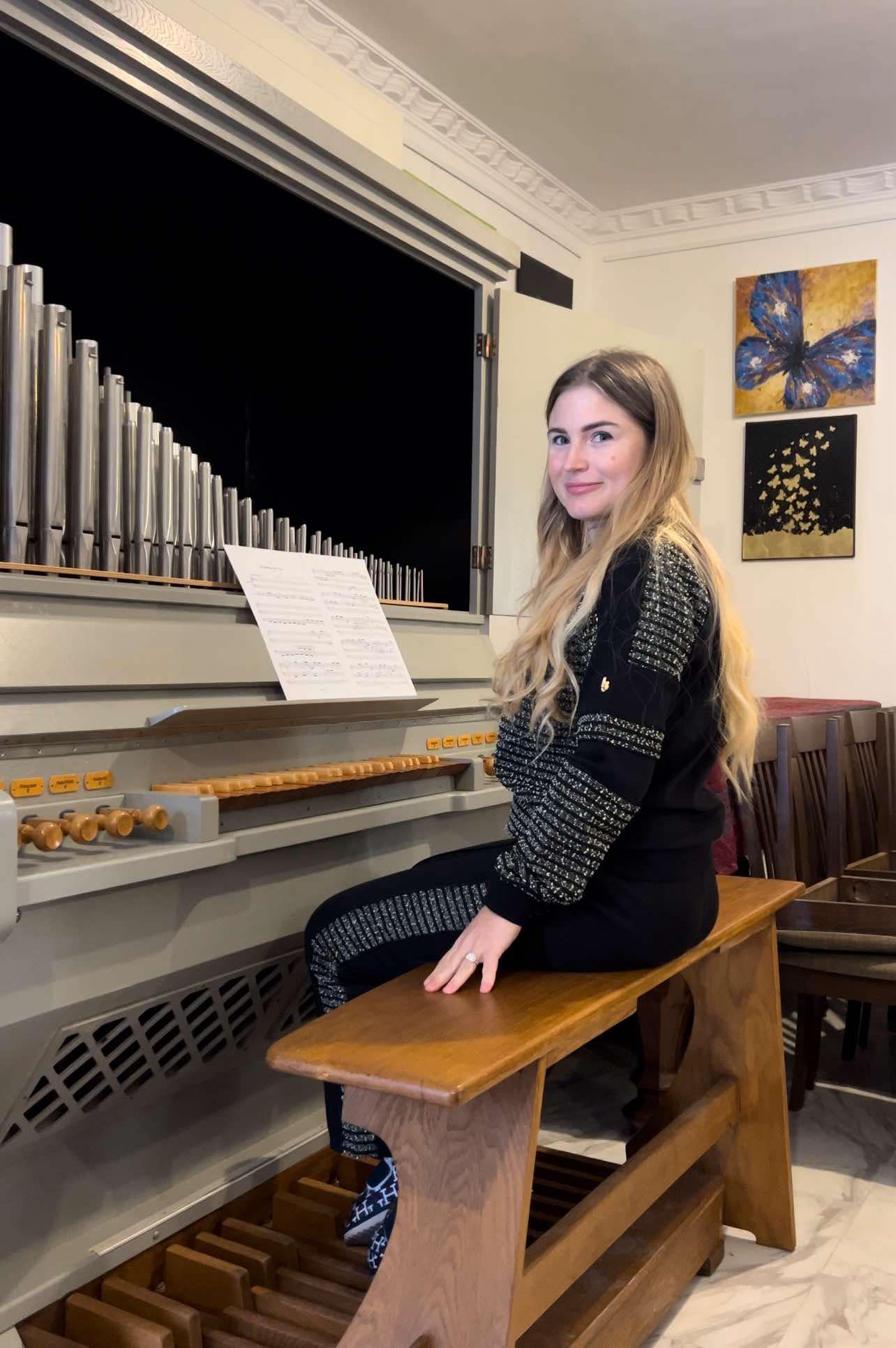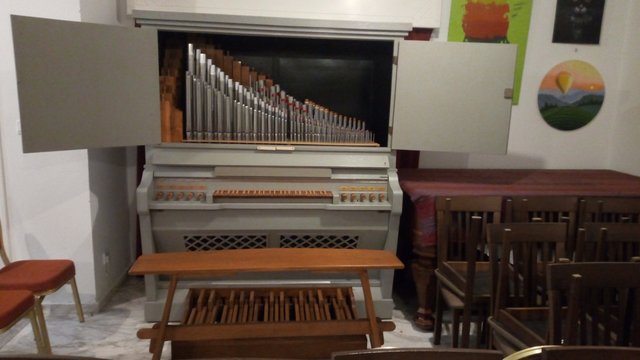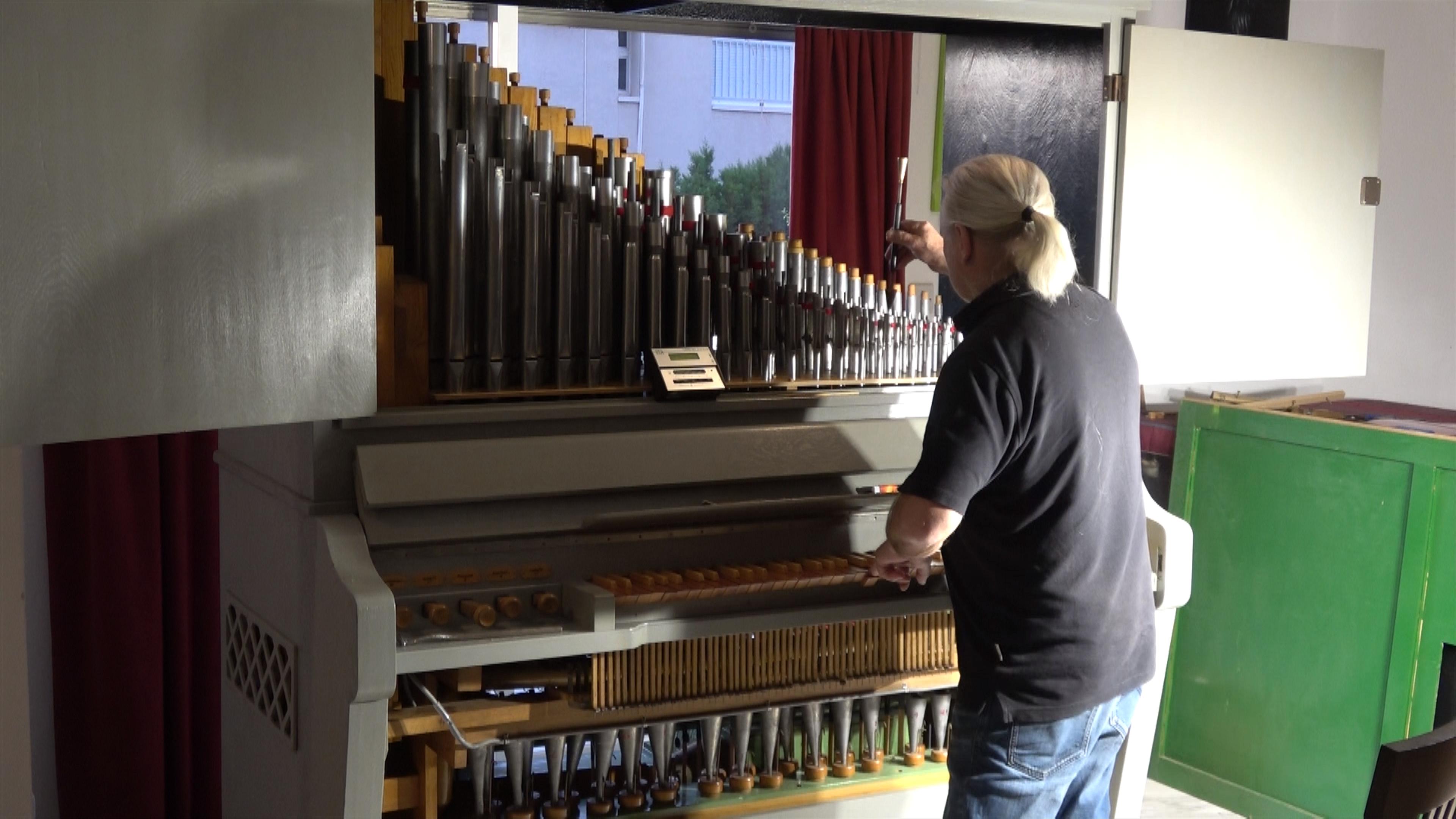The Tatiana Stupak School of Music in Limassol is now the proud owner of the island’s second pipe organ, but it’s been quite an adventure
By David Pentecost
Tatiana Stupak was trained in piano and organ playing while studying at the St Petersburg Conservatory. I was trained in organ playing in London in 1987 by the late Catherine Ennis, a former president of the Royal College of Organists in the UK.
Tatiana founded the Tatiana Stupak School of Music in Limassol in 2018. Since December 2019, she has held one or two charity organ concerts each year at St Catherine’s Catholic Church in Limassol. The organ at this church is an electronic organ, without pipes, and at the time the pedalboard was not functioning.
Tatiana particularly missed playing on an organ with a pedalboard. In 2022 I arranged for her to play on the biggest organ in the UK, at Liverpool Anglican Cathedral, whilst on a holiday in England. This organ has 10,268 pipes. But she needed to practice on an organ with a working pedalboard, before travelling to England.

I did some research and discovered that there was just one pipe organ with a pedalboard in Cyprus – at St Mary of Graces Catholic Church in Larnaca. I contacted the priest and arranged for Tatiana to practise a Bach Prelude and Fugue. She managed this very successfully. She then wanted to make a video of the church, and asked me to provide some sound, by playing the organ. I had no sheet music with me, so I had to improvise a new work, which eventually became my Prelude, Opus 69. Our subsequent visit to Liverpool Cathedral, and both of us playing the organ was a wonderful experience.
David Pentecost playing at the Catholic church in Larnaca video is on YouTube at https://youtu.be/YWsQzFD6cfo)
In the autumn of 2023, Tatiana’s resolved to try to buy her own organ, and she wanted it to be a traditional pipe organ.
There is quite an active market in Europe and elsewhere by sellers of pipe organs. They are generally quite old and are often sold because the churches where they were housed, had become redundant, through lack of use, and were being demolished. Other organs are being dispensed with in favour of modern electronic organs, many of which do not have organ pipes, but produce the sound of organ pipes with electronically generated sound.
Tatiana and I both started looking for a second-hand pipe organ to install in her music school. We found a few in England, but they were overpriced.
By April 2024, we had both found one, owned by an organ builder whose workshop is in Poland. It was small enough to fit in Tatiana’s school, and Tatiana started negotiating with the owner. Although he was in Poland, he was German and spoke no English. He would not communicate by email, only by Facebook Messenger. I helped Tatiana with the transmission of messages to and fro for several weeks, using my schoolboy German from 70 years ago, and some help with Google Translate.
Eventually Tatiana agreed a price and he packed the organ ready for shipping to Limassol. Tatiana arranged with a Limassol shipping company to collect and import the organ, and it eventually arrived at her music school on July 26, 2024.
Cyprus then had its second pipe organ, but it was not playable because the pipes had to be unpacked from their carefully protected storage boxes, installed and tuned. The organ seller – Herr Marian Graun – had to travel from Poland to Limassol to do this because there are no organ builders or servicing mechanics in Cyprus, as far as is known.
Herr Graun finally arrived in Cyprus almost four months after the organ had been delivered to the school, on November 17. He comes from a historic musical family and is a distant cousin of the writer Vladimir Nabokov. Marian’s father was a very good organist, who originally installed Tatiana’s organ in a German church. Marian Graun is a multiple great grandson of Carl Heinrich Graun (1704-1759), the finest 18th century German composer of Italian operas (26 of them for the Berlin State Opera). Carl Heinrich Graun worked for Frederick the Great, who put him in charge of the Berlin State Opera. Graunstrasse, a street in Berlin, is named after him and cousins of Marian Graun still live there today.

Tatiana’s single-keyboard semi-mobile organ, known as a Positive, was bought by Marian Graun’s organist father in 1973 from the congregation of a German church. He later sold it to the Catholic Church in Hanigsen, near Hanover, and maintained it for them. The church ceased functioning in 2014, and Marian Graun was able to buy the organ.
I spent nearly all day, every day from November 17 at the school until four days later, acting as Herr Graun’s assistant, filming him working, and helping him to test the organ. It was a two-man job at times to complete the installation and to tune all 243 pipes. It was fascinating.
During the transportation from Poland, some damage had been done, in spite of careful packing, and we had to effect some intricate repairs. At one point, Marian Graun astonished me by asking for a broom! (All this conversation was of course in German, and I had to resort to translation software on my smartphone). I found a rake in the garden, and was amazed to see how skilfully he poked the handle of the rake into one dented and delicate aluminium organ pipe, and gradually reshaped the pipe back to its original form, while I leaned on the long rake handle to stop it from moving.
The following three days were spent making repairs and tuning the pipes. I had to play the organ for an hour or so, which brought to light some faults, which were fixed, not always easily.
Video of installing the organ on YouTube at https://youtu.be/YjNV-qOWW_I
Tatiana’s organ was made by the German family firm of E. Kemper & Sohn, in Lubeck, Germany. The exact year of manufacture is not known, but it was built in the 1950s-1960s period. Kemper was an organ building firm which operated from 1868 until 1987, when it ceased building organs, but continued servicing them.
Most organs are unique in their construction, and they are usually built to order, for a particular location. The organist coming to an organ for the first time, needs to study the available stops and the sounds which they produce, in order to decide which stops to use for a particular piece of music, and when and how to change the stops at significant places in the work, for example at the start of a movement. It can therefore be much more complicated to play a piece well on an organ, than to play it well on a piano. On the other hand, there is no volume control on some organs, including this one, so that aspect is easier on an organ than on a piano.
To celebrate her long musical struggle, Tatiana Stupak is holding an inaugural organ concert at her music school on December 18, a private event for invited special guests only. Limassol mayor Yiannis Armeftis has very kindly agreed to attend and open the concert, to celebrate the acquisition of the second pipe organ in Cyprus, and the first one which is privately owned. The concert will feature Tatiana Stupak and several of her best music school students.
David Pentecost playing at Liverpool Anglican Cathedral video is on YouTube at https://youtu.be/YWsQzFD6cfo)
Video of installing the organ on YouTube at https://youtu.be/YjNV-qOWW_I






Click here to change your cookie preferences